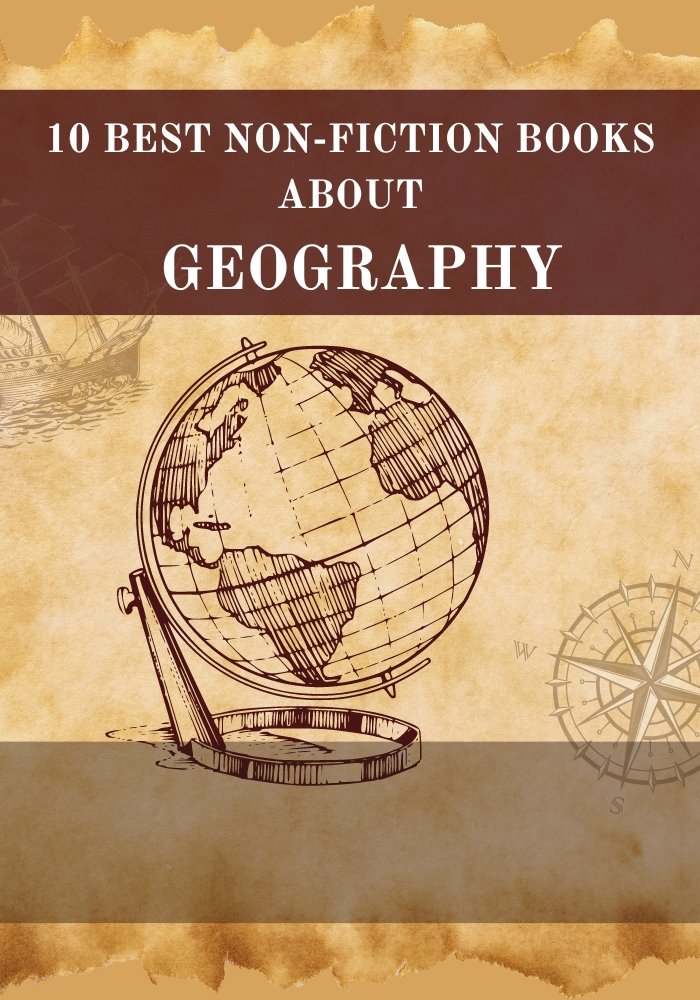Introduction:
Dive into the fascinating world of geography with our guide to ten impactful non-fiction books. Geography does more than chart lands it informs our global comprehension. These selections offer more than geographical knowledge, they connect the physical landscape with the societal structures that define our interactions. Ideal for map lovers, avid travelers, and anyone eager to decode the complexities of cultural and ecological diversity, this guide is a practical resource brimming with valuable insights.
Each book on this list is carefully chosen to illuminate the multifaceted role of geography in shaping historical and contemporary realities. They not only inform but captivate, blending academic rigor with captivating narratives. Designed for those keen to grasp the enduring impact of geographical dynamics on our history and potential futures, these books offer concise yet profound explorations.
Embark on a journey through these works, each offering unique perspectives that promise to deepen your understanding of our world. Let’s explore these exceptional books, each a standout in elucidating the intricate web of geography.
1. “Guns, Germs, and Steel” by Jared Diamond

Jared Diamond’s significant work, “Guns, Germs, and Steel,” delves into the distinct trajectories of societies through a clear and informative lens. The book explains how geographic and environmental conditions have historically influenced global disparities. Diamond’s narrative is compelling as he breaks down complex theories into understandable insights, encouraging readers to reflect on geography’s role in shaping human history. This book serves as a clear, concise guide through the evolution of civilizations, highlighting pivotal factors that have directed human progress.
2. “The Geography of Thought” by Richard E. Nisbett

Richard E. Nisbett’s “The Geography of Thought” scrutinizes how cultural environments distinctly shape cognitive styles. The book articulates specific impacts, showing how, for instance, East Asian societies prioritize holistic views seeing objects in relation to their context while Western cultures often adopt an analytical stance, focusing on categories and rules. Nisbett supports these observations with case studies and experimental data, revealing the deep roots of these cognitive styles in their respective geographical and cultural histories.
Nisbett not only details these cognitive contrasts but also engages readers by posing questions that encourage them to reflect on their thought processes and cultural influences. He argues convincingly, using a range of psychological studies and historical examples, that our geographic settings extend beyond physical environments to fundamentally shape our ways of thinking and cultural identities.
3. “Prisoners of Geography” by Tim Marshall

Tim Marshall’s “Prisoners of Geography” delves into how geography’s tangible elements mountains, rivers, and plains shape political strategies and international relations. He effectively uses real-world examples, such as Russia’s strategic use of its vast terrain to extend its power, to illustrate these points. Marshall’s narrative combines detailed descriptions with an accessible style, making complex geopolitical issues understandable for readers.
This book prompts a critical examination of the often-overlooked geographical factors that influence global dynamics. Marshall highlights how geographical borders and natural resources dictate not only the politics of a nation but also its interactions on the world stage. Through this analysis, he encourages readers to see beyond conventional political narratives and consider how physical geography plays a crucial role in shaping global affairs.
4. “Collapse: How Societies Choose to Fail or Succeed” by Jared Diamond

In “Collapse,” Jared Diamond explores the intricate dynamics between environmental conditions and societal stability through comprehensive case studies ranging from the ancient Maya to contemporary Montana. He specifically examines how variations in resource availability and environmental challenges have shaped civilizations’ outcomes.
Focusing on critical geographic and ecological factors like resource management and climate variations, Diamond highlights their profound impacts on societal success or failure. He provides detailed accounts, such as deforestation in Easter Island and water scarcity in the Great Plains, linking these environmental issues to significant societal disruptions.
Diamond supports his conclusions with a robust blend of data, historical records, and expert analyses, underscoring the severe consequences of ecological neglect and the pressing need for sustainable practices.
5. “The Map That Changed the World” by Simon Winchester

Simon Winchester’s “The Map That Changed the World” recounts the significant achievements of William Smith, an English canal digger whose pioneering geological map dramatically advanced our geological knowledge. Winchester delves into how Smith’s work laid the foundations of modern geology by providing the first comprehensive view of underground Britain.
The narrative skillfully blends detailed historical context with accounts of Smith’s challenges, showcasing the map’s transformative effect on science. For example, Winchester describes how Smith correlated fossils with sedimentary strata, a method that was revolutionary at the time.
The book goes beyond a simple biography, addressing the broader implications of Smith’s work and the obstacles he faced, including professional ostracism and financial hardship. Winchester’s discussion of these struggles provides a deeper understanding of the 19th-century scientific community and its resistance to new ideas.
Celebrating overlooked figures in science, Winchester illustrates the profound impact of Smith’s map on both geology and the development of cartography. His compelling writing explains why Smith’s map was groundbreaking, making the book essential for those interested in the intersections of science, history, and mapping.
6. “The Power of Place” by Harm de Blij

In “The Power of Place,” Harm de Blij presents a detailed analysis of how our geographic location profoundly affects our lives, communities, and futures. De Blij convincingly argues that despite the rise of digital technologies fostering global connections, the significance of one’s physical surroundings persists, shaping aspects like health, economic prospects, and political trajectories. By integrating a range of anecdotes, such as the contrasting health outcomes observed in different geographic regions, along with case studies like the economic development disparities between coastal and inland areas, De Blij clarifies complex geographic concepts in a relatable manner. The book prompts readers to reevaluate the influence of geographic location in modern society and provides insightful discussions on the unseen geographical forces that shape global events, such as climate change impacting agricultural productivity. This work not only broadens one’s understanding of geographic determinism but also highlights the nuanced interplay between our environment and societal evolution.
7. “Why Geography Matters” by Harm de Blij

In “Why Geography Matters,” Harm de Blij argues for the significant role geography plays in making sense of our interconnected world. He skillfully links geographical knowledge to a wide array of global issues, such as explaining the role of topography in disease spread and how political boundaries influence terrorism. The book articulately demonstrates why understanding spatial relationships is key to addressing modern challenges from climate change to global politics. De Blij advocates strongly for integrating geography into education and policy-making, detailing how this can lead to more informed decisions and effective solutions. For instance, he describes how geographic awareness can transform approaches to environmental policy and crisis management. His analysis is not just theoretical, he offers practical frameworks for readers to apply geographic concepts to real-world problems, making the book a valuable resource for those looking to decipher and address the complexities of the 21st century. Through detailed examples and persuasive arguments, “Why Geography Matters” serves as both a compelling plea for educational reform and a guide to understanding global dynamics through geographic lenses.
8. “The Revenge of Geography” by Robert D. Kaplan

In “The Revenge of Geography,” Robert D. Kaplan delves into the enduring impact of geography on the political destinies of nations. He argues that geographical features like mountain ranges and rivers continue to shape strategic decisions, even in an age dominated by digital communication. For example, Kaplan discusses how the Himalayas influence Indo-Chinese relations by acting as both a barrier and a point of contention. The book employs detailed case studies, such as Russia’s geopolitical maneuvers in Eastern Europe, influenced by its vast plains which have historically invited both invasion and expansion. Kaplan combines historical context with contemporary analysis, showing how geographic realities are integral to understanding global tensions and alliances. This synthesis of history, geography, and political science offers readers a nuanced perspective on how persistent geographic factors are, influencing everything from trade routes to military strategies. Kaplan’s emphasis on viewing the world map through a strategic lens provides essential insights for anyone keen on geopolitics, making the complex interplay of history and geography accessible and relevant.
9. “Cosmos” by Carl Sagan

In Carl Sagan’s “Cosmos,” the author transcends typical geographical discussions to delve into the expansive universe. The book, while not solely focused on Earth, illuminates our planet’s role within the vast cosmic framework through detailed examples and enlightening comparisons. Sagan guides readers across space and time, merging scientific facts with philosophical inquiry and a pursuit for knowledge. His clear writing style and ability to simplify complex scientific concepts contribute to the book’s status as a classic. Through Sagan’s engaging storytelling, readers gain a greater understanding and appreciation of the universe’s intricacies and our responsibility towards Earth. “Cosmos” challenges us to reflect on humanity’s place within the cosmic expanse and our connection to all life, presenting itself as crucial reading for those intrigued by our cosmic positioning.
10. “The World Without Us” by Alan Weisman

Alan Weisman’s “The World Without Us” delves into an Earth devoid of humans, offering a compelling view of nature’s reclamation of urban and rural areas. The book skillfully intertwines science, history, and environmental concerns to depict a planet where natural processes gradually erase human impacts, exemplified by the gradual overgrowth of cities and landmarks. Weisman provides a detailed account of ecological succession in such human-free zones, juxtaposing these scenarios with the current environmental state of our world. By offering precise descriptions and scientific projections, he presents a vision of a robust ecosystem that flourishes without human interference, prompting readers to contemplate our environmental legacy. “The World Without Us” serves not only as a speculative journey but also as a reflective piece on our environmental decisions and their long-term effects, urging a reconsideration of our interactions with nature.
Conclusion
Exploring ten exceptional non-fiction books about geography invites readers to understand the diverse and extensive ways in which we comprehend our world. Each book provides insights into the dynamic forces that mold our societies, environments, and histories. From exploring ancient civilizations to considering a future Earth devoid of humans, these works highlight the critical role of geography in understanding our past, shaping our present, and envisioning our future.
These books offer more than mere academic knowledge, they are gateways to understanding the intricate layers of our planet. They prompt readers to view the world through new lenses, appreciate the significance of geographical factors, and contemplate our interconnectedness within the ecosystem. Engaging with these texts not only enriches one’s knowledge but also fosters a deeper, more nuanced relationship with the world that surrounds us, empowering us to navigate and appreciate the geography that defines human existence.






